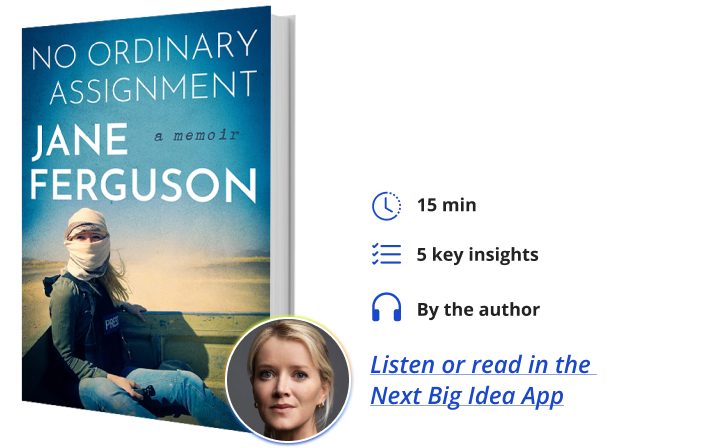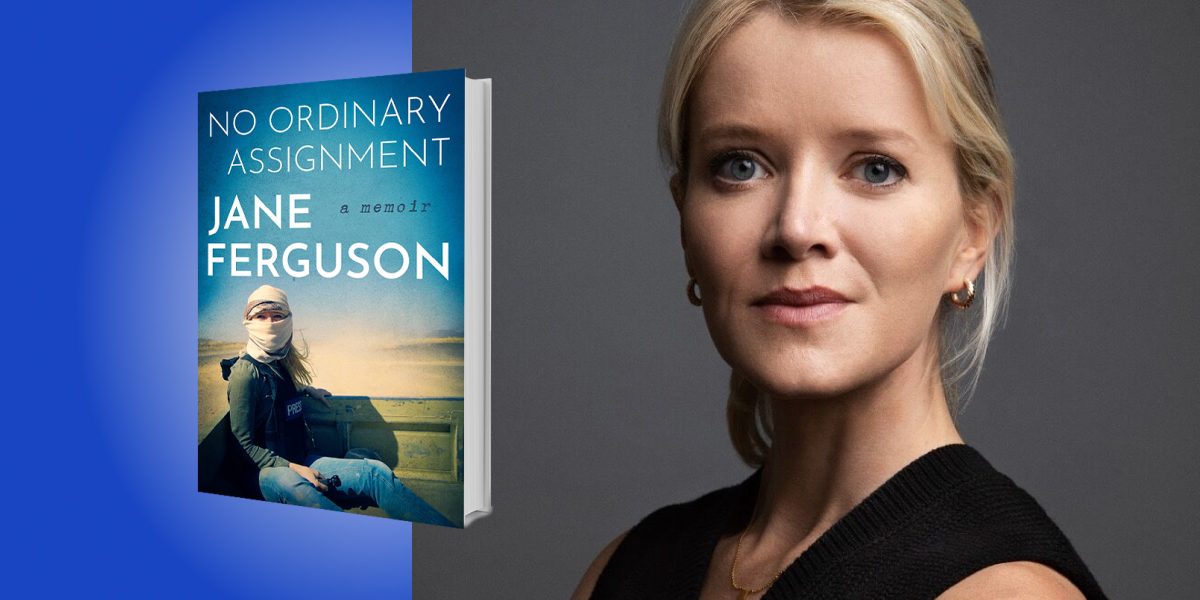Jane Ferguson is a special correspondent for PBS NewsHour. Her reporting has won an Emmy Award, a Peabody Award, the George Polk Award, and the Aurora Humanitarian Journalism Award, among others. She is a frequent contributor to the New Yorker.
Below, Jane shares 5 key insights from her new book, No Ordinary Assignment: A Memoir. Listen to the audio version—read by Jane herself—in the Next Big Idea App.

1. Pay attention to what you loved as a child.
What drew your attention, what did you adore, and why do you think that was? Get to know who you were back then and you will know something more about what makes you happy now. Is it sports, stories, photography, engines, cars, travel? Connect the dots and find something related to that.
For me, as a little girl, it was storytelling. It was also foreign affairs, as I was a bit of a dork, but also travel, writing, and television.
2. Always have a final goal in mind, but remember that master plans are not necessary.
Master plans may actually be counterproductive. All you need is a goal, very clear in your mind. Focus on the role you want, the life you want, what that will feel like and the next step forward. Everything else in between, you can deal with as it appears.
“Focus on the role you want, the life you want, what that will feel like and the next step forward.”
This leaves you flexible enough to see and seize opportunities when they appear and evolve and follow your own path. When I was building a career in international reporting, there were many times when I had no idea how I was going to get a job somewhere. I often failed, and faced relentless amounts of rejection. The way to bounce back from that was to find the next step forward. Just one step and I was on my way again.
3. Excellence is key.
We live in an era of fast success, with the Mark Zuckerbergs of this world, and seemingly overnight successes. Young people are bombarded with the idea that if you are not a breakout star, you are somehow falling behind. The Top 25 Under 25 and 30 Under 30 Lists are total nonsense. Ignore them.
There is no gaming the system and overnight success is a myth. Anytime I’ve seen overnight success, it doesn’t last. The best way to succeed, and the only way to build truly authentic success at what you do, is to be undeniably brilliant at it. Seek excellence within yourself for the sake of knowing you are masterful at your craft. Study it. Study how others do it. Work on getting to be the best and most skilled, and this will slowly but most certainly be noticed. When the success comes, it will feel all the more fulfilling.
While working on becoming a journalist, I was not working within the structure of a news organization. I was learning by myself as a freelancer. I studied other more senior correspondents’ scripts, watching the evening news reports and transcribing their voices so I could figure out how they’d structured it. I watched how sequences of shots were filmed and put together. I studied languages, did endless background research before interviews, and dug into the history of everywhere I was reporting from. Each and every year, I wanted to see my own skills and my own reporting improving exponentially. The only falling behind there is is not getting better at what you do.
4. Do not compete with anyone other than yourself.
Learn from others. Study them. Take what is helpful in terms of their experience, but remind yourself that you are not competing with others. You only compete with yourself. When you do that, no one can compete with you.
In the earlier parts of my career, I would tie myself in knots wondering if I was going to be able to keep up with the career trajectories of other correspondents. Finally, I began to not think about them much at all. Instead, I recognized my only job was to keep moving forward on the path that was my own, reporting the stories that mattered to me regardless of what others were doing. I followed the angles and places that drew me away from the dramatic “bang, bang” stories, and stopped worrying about my career. From then one, I just got on with the work.
“As I stopped focusing on what others were doing, I had become a better storyteller.”
At dinner in Beirut one night, years ago, my friend told me they had noticed this shift in me. “I was watching you on the TV the other night and I thought, there you are. That’s Jane.” As I stopped focusing on what others were doing, I had become a better storyteller. I was more myself and more authentic. Run your own race and remember what Ram Dass said, “Treat everyone you meet like God in drag.”
5. Remember that, beyond your desire to live a big life, to be successful by most tangible measures, and to reach your potential, your work will always need to be of service to the world.
Ask yourself what service you are providing in the world. There must be a bigger dimension to what you are doing, that higher-level perspective. Be humble and be additive. The world doesn’t owe you a career. You are privileged to do what you do, so make it count, and always remember why you are doing it.
In my life and work, people often thank me for what I do. They suggest that only someone as brave as me would dare to go to these places and how few of us there must be. The truth is, newsrooms are full of young, talented, driven, and skilled journalists desperate for the opportunity to get out on assignment. I have been one. When I’m doing my work, I remember what a privilege it is to do it. The best way to acknowledge that privilege and do it justice is to remember you are to be of service to this world. That’s also the only real way to love what you do and build a meaningful career.
To listen to the audio version read by author Jane Ferguson, download the Next Big Idea App today:































